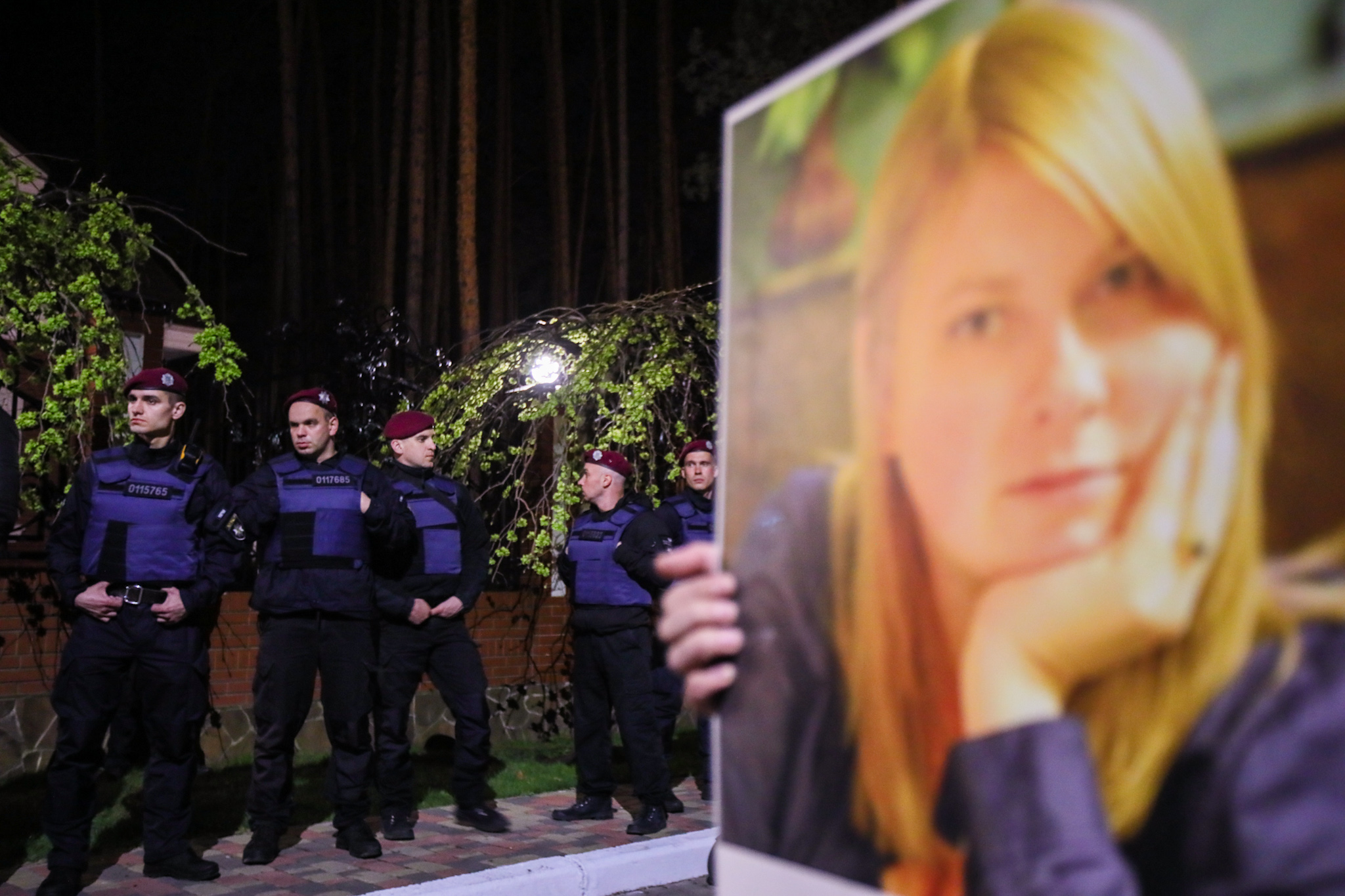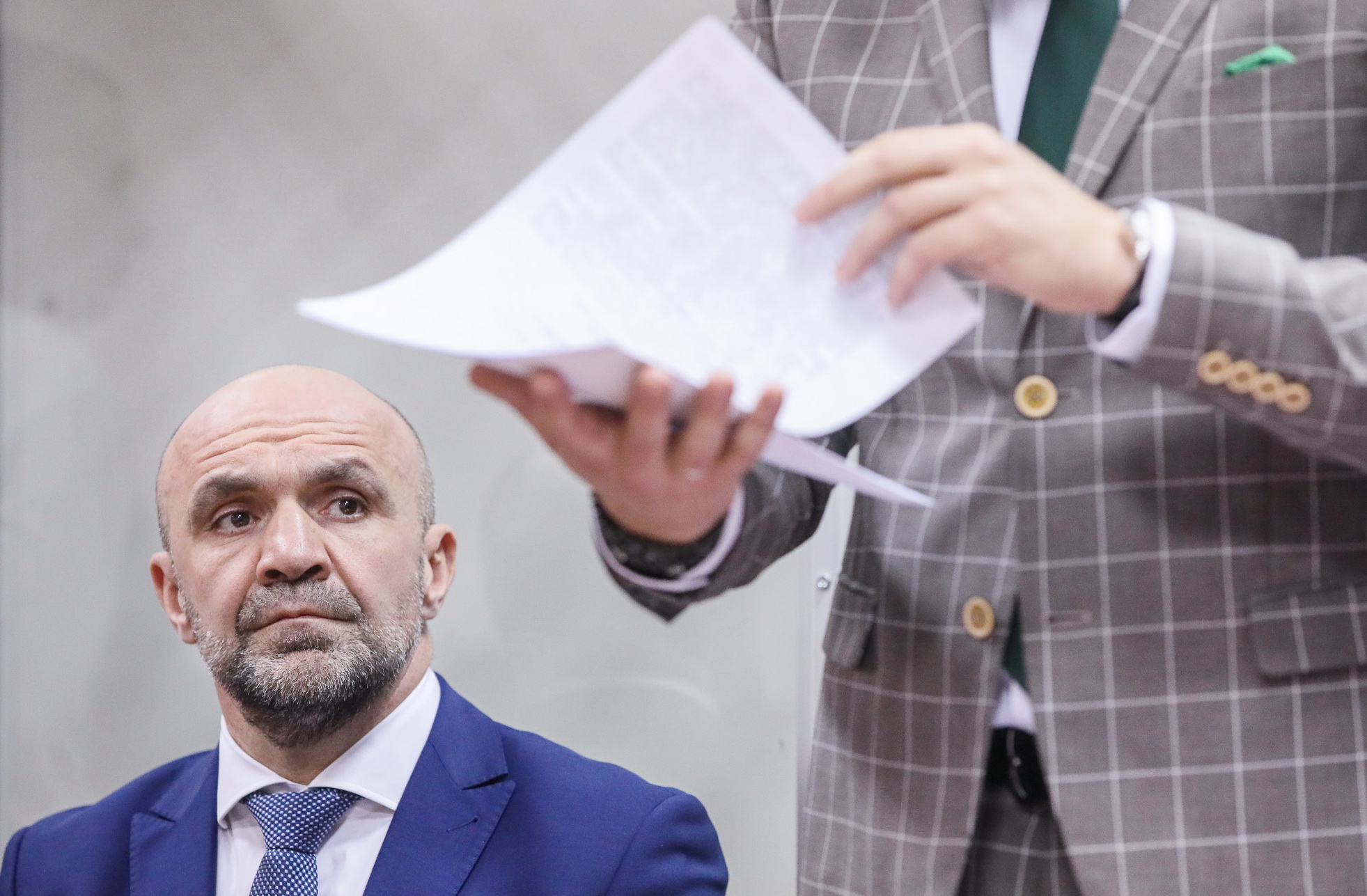Just a year ago, a group of men attacked outspoken Kherson municipal official Kateryna Gandziuk with sulfuric acid. Three agonizing months later, she died of severe burns.
Before she died, Gandziuk told journalists that she suspected Vladyslav Manger, a powerful Kheron Oblast official, of ordering her murder. She and her friend published an investigation about Manger’s corruption and criminal ties, and she worried about retribution.
Prosecutors agreed the evidence points to Manger, but he may go free, so might others implicated in ordering the attack. One of them, Oleksiy Levin, is hiding abroad. Another one, Ihor Pavlovsky, was recently released from detention.
“All this indicates the cases could be closed,” warns Yevheniya Zakrevska, the Gandziuk family’s lawyer.
She says there were no positive developments in this case since June 6, when five men who did the dirty work received their sentences only several years in prison each. They were convicted not for murder, but for a lesser charge: “intentionally inflicting serious bodily injuries that led to death.”
Prosecutor General Yuriy Lutsenko disagrees. “There is significant progress in the Gandziuk case regardless of what a group of activists regularly say,” he said in a video comment shared by his spokesperson on Aug. 6.
Activists’ investigation
Gandziuk’s 2018 murder sparked outrage across Ukraine. It was one of at least 10 killings of public activists and journalists since the EuroMaidan Revolution, the popular uprising that ousted Kremlin-backed President Viktor Yanukovych. Most of these crimes remain unsolved.
At the time of attack on her, Gandziuk served as deputy mayor of Kherson, a city of 290,000 residents located in 550 kilometers south from Kyiv. In that position, she exposed corruption in the city and the surrounding oblast.
After Gandziuk was murdered, her friends united in the Facebook group “Who killed Katia Gandziuk?” and organized rallies across the country.
Throughout the year, the activists — and not law enforcement — were the main driving force in this case. Thanks to their efforts, the police released an innocent man who was first captured as an alleged attacker and then arrested those believed to be the real attackers.
The activists identified the alleged intermediary, Pavlovsky, which forced law enforcement to start investigating and eventually arrest him. Pavlovsky was a well-connected Kherson businessman and an aid of lawmaker Mykola Palamarchuk.
The activists also named three Kherson Oblast officials — Manger, head of the Kherson Oblast Council; Andriy Gordeev, then Kherson Oblast governor; and Yevhen Ryshchuk, then Gordeev’s deputy — and accused them of ordering the murder. All three deny this.

A man holds a picture of Kateryna Gandziuk as protesters rally by the house of Prosecutor General Yuriy Lutsenko near Kyiv on April 25, 2019. Activists wanted Lutsenko to investigate her murder. (Volodymyr Petrov)
Trial
On June 6, the Pokrovsky District Court of Dnipro city sentenced five former volunteer Ukrainian military fighters for the attack on Gandziuk. Earlier, the prosecution had charged them with murder, but decreased the charges after all five admitted their guilt and agreed to cooperate with the investigation.
The leader of the group, Serhiy Torbin, was sentenced to 6.5 years. Mykyta Hrabchuk, who poured acid on Gandziuk near her house, received six years. Volodymyr Vasianovych and Vyacheslav Vyshnevsky, who assisted Hrabchuk in getting to the location of the attack and escaping, received 4 years each one. Viktor Horbunov, who bought the liter of sulfuric acid used for the crime but refused further involved in the attack, received 3 years.
According to the investigation, Torbin received money from those who commissioned the attack and paid his accomplices from $300 to $500 for their work.
Though Gandziuk’s father was disappointed with the reduced sentences for the attackers, the family hoped they would testify against those who ordered the crime.
The court decision states that the individual behind the attack is a “Kherson politician involved in illegal logging disguised as arson in the forest, whose activity Gandziuk exposed,” and the intermediary is an “aide to Kherson Oblast Council lawmaker Mykola Stavytsky,” according to Ukrinform.
Though the court decision doesn’t name these individuals, it hints at Manger and Levin, a former aide to Stavytsky who was earlier convicted of murder. Levin is now hiding abroad.
End clients
In October 2018, while lying in her hospital bed after the attack, Gandziuk gave the last interview in her life to the Slidstvo.Info investigative program. There she named Manger as the person whom she suspected of ordering the attack.
She said Manger was angry about the video investigation that she and her friend, journalist Serhiy Nikitenko, carried out against him in 2017. Manger took them to court over the film, which accused him of corruption and criminal ties, but lost in June 2018.
“Manger has criminal allies who could carry out this crime,” Gandziuk said in the interview. In interviews with the Kyiv Post, her friends have named Manger as a suspect since August 2018. Manger has repeatedly denied any involvement in the crime.
In January, Gandziuk’s father accused Manger, Gordeev, and Ryshchuk of his daughter’s murder. He blamed former Prime Minister Yulia Tymoshenko, whose party Manger represented in Kherson, for covering up for him. He also accused then-President Petro Poroshenko of covering for his party members, Gordeev and Ryshchuk.
In February, Lutsenko, who initially accused the activists of hampering the investigation, brought charges against Manger. He said that Manger hired Pavlovsky and Levin and paid them at least $5,600 to organize the attack on Gandziuk.
Lutsenko also said the prosecutors had some evidence that Ryshchuk was involved in illegal forest logging, which Gandziuk had criticized, but had no evidence that Ryshchuk could be linked to the attack on her. Lutsenko added that he had no evidence against Gordeev.
On Feb. 15, a court ordered Manger arrested, but he walked free the same day after paying $96,000 in bail. Manger claimed the case against him was politically motivated in an attempt to pressure his party boss Tymoshenko, who along with Poroshenko was one of the front-runners in the presidential campaign at that time.
In late April, the prosecutors changed the charge against Manger from ordering the murder to “ordering the infliction of serious injuries.” On Aug. 3, the deadline for the investigation of the case against him expired, after prosecutors failed to extend it.
Gandziuk family lawyer Zakrevska fears Manger may evade any criminal liability in this case. “Why didn’t prosecutors extend the statute of limitations of the investigation?!” she said.
On July 16, the Prosecutor General’s Office halted the investigation against Manger and Levin, claiming it needed more time to get to Levin, who is hiding abroad, a document published by Slidstvo.Info shows. Manger’s lawyer Dmytro Ilchenko said the decision to halt the case is illegal.
If Manger challenges it in court and the court takes Manger’s side, the case against him will be automatically closed and he can never be investigated again on these charges, Zakrevska said.
Lutsenko promised on Aug. 6 that, by the end of the week, the case against Manger would be completed and ready to be sent to court.
“Is this some promising news or just another tale by the Prosecutor General?” Gandziuk’s father wrote on Facebook in response to the news.

Head of the Kherson Regional Council Vladislav Manger, who is a suspect in an investigation of the murder of Ukrainian anti-corruption campaigner Kateryna Gandziuk, attends a court hearing in Kyiv, on Feb. 12, 2019. (Volodymyr Petrov)
Intermediaries
Just like Manger, Pavlovsky also has a chance to get away with murder, Zakrevska believes.
Pavlovsky was arrested on Nov. 12 by officers of the SBU state security service. It came a week after Gandziuk’s friends publicly accused him of involvement in the crime. Pavlovsky was held in jail until the end of April, when the court transferred him to house arrest and obliged him to wear an electronic bracelet.
On July 28, a friend of Pavlovsky posted a photograph with him on Facebook. The two men were at a soccer match in Odesa. After that, Andriy Lysenko, spokesman for the Prosecutor General’s Office, reported that Pavlovsky’s house arrest term had expired, so he could legally attend the match.
On Aug. 5, Gandziuk’s father unexpectedly discovered that Pavlovsky’s case would be heard by a court in Odesa. His charges had been changed from organizing the murder into concealing it. Pavlovsky’s lawyer, Maksym Boldin, is one of five people whom President Volodymyr Zelensky named as candidates for Odesa governor.
Lutsenko claimed that Pavlovsky had admitted guilt and agreed to plea bargain with prosecutors. Zakrevska said Gandziuk’s family knew nothing about the deal.
“How can they make this deal without the agreement of the victim’s side?” Zakrevska said.
Lutsenko claimed that a plea bargain with Pavlovsky would allow the prosecutors “to bring the organizers to (criminal) responsibility, including Mr. Manger and Mr. Levin.”
Levin left the country soon after the attack. Only in May, 10 months after that, did the Prosecutor General’s office announce that it would apply to add him to the international wanted list. He still cannot be found on Interpol’s publicly available list of Red Notices, but Lutsenko says Interpol and Ukraine’s foreign partners are working on his extradition.
Other accomplices
Lutsenko said that his office is working to find evidence against several other likely accomplices in Gandziuk’s killing, but did not provide any details. He has also hinted that Ryshchuk or Gordeev failed a lie detector test while being questioned in the case.
Both Ryshchkuk and Gordeev have resigned from the posts under public pressure. But Manger remains at the helm of the Kherson Oblast Council.
In the July 21 election, Ryshchuk ran for parliament in a Kherson Oblast single-member district, but lost to a candidate from Zelensky’s party.
Gandziuk’s father, who has kept all the things in his daughter’s room intact and regularly visits her grave, dreams that the killers will one day be brought to justice.
“I wanted to open internet in the morning and see that Manger is under arrest again, Gordeev is under arrest, Ryshchuk is under arrest,” he said in a recent interview with Hromadske TV. But he fears he will never see that news, he added.
